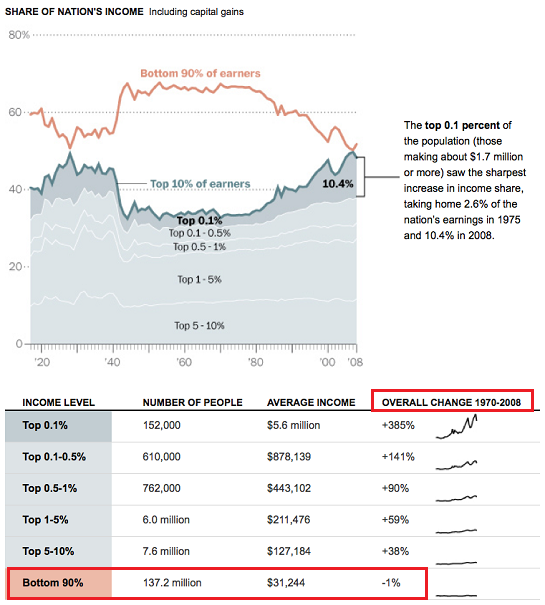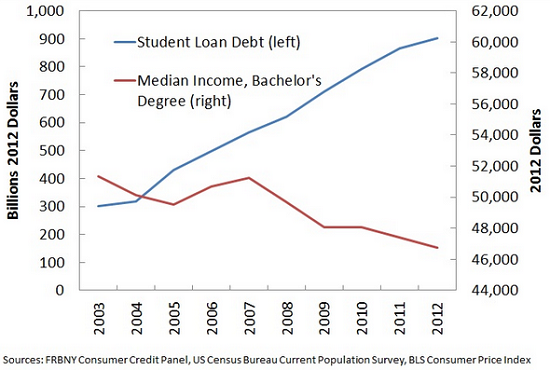How Much of our Work Is Compliance, Enforcement and Menial Servitude to the New Aristocracy?
April 28, 2015
It's difficult to estimate the quantity of our work devoted to data-shuffling compliance with and enforcement of perverse regulations and neofeudal menial-servitude to the top 10%.
A spate of recent articles have investigated the nature of today's jobs:
The Cult of Work You Never Meant to Join
The Tyranny of the Forced Smile
These articles implicitly raise a question: how much of our work is compliance with regulations, enforcement of those regulations and menial servitude to the New Aristocracy, i.e. the top 10% who have prospered as financiers and the technocrats who manage the central-state/vested-interests status quo?
While the technocrat class has been doing better than everyone else, even the top ranks of the work force are experiencing stagnant incomes: Even the Most Educated Workers Have Declining Wages (when adjusted for inflation).
One of the many drivers of this trend to lower-paying, menial-servitude types of work is deregulation, which perversely increases the need for more regulation and low-value paper-shuffling: David Graeber's Utopia of Rules: why deregulation is actually expanding bureaucracy
Graeber's new book is titled The Utopia of Rules: On Technology, Stupidity, and the Secret Joys of Bureaucracy.
Another reason is that most of the income gains of the past few decades have flowed to the very top of the income pyramid:

Since the top apex has sucked most of the financial oxygen out of the system, much of the system has adapted by serving the needs of those few who have benefited from financialization.
More education is not the answer--though assistant provosts to the adjunct deans currently skimming huge salaries are anxious to keep their share of the higher-education gravy train.
Despite the ceaseless propaganda about the value of college--translated into English, this means, "please keep borrowing $100,000 for a worthless degree so I can keep my $250,000 per year job as assistant provost to the adjunct dean of academic standards and political correctness in the Educrat Industry"--the reality is the wages of college grads are not keeping pace with the soaring cost of supporting all those assistant provosts to the adjunct deans and shiny new admin buildings on campuses.

Those on the bottom of the higher-education food chain aren't doing as well as the well-paid educrats; many of those who are actually doing the lowly, poorly paid work of teaching students qualify for social welfare programs:
Someone Calculated How Many Adjunct Professors Are on Public Assistance, and the Number Is Startling
The student debt-serfs who paid for all the shiny new buildings and fat admin salaries with future earnings aren't doing so well, either: "Staggering" Student Loan Defaults On Deck: 27% Of Students Are A Month Behind On Their Payment
Another factor is the rising dominance of industries that are mostly low-value paper-shuffling: healthcare (up to 50% of the costs in the U.S. system is estimated to be shuffling paper or fraud enabled by the blizzard of insurance claims), higher education, which is increasingly a factory for loans and high-overhead issuance of credits and credentials, and of course the debt industry itself: the financial sector and its various pools of predators and parasites.

This leads to a question that must be asked of every post-industrial economy burdened with a regulatory utopia mandated by the state/vested-interests neofeudal arrangement: are we really producing anything? Is the UK really producing anything?
Meanwhile, access to the technocrat class is narrowing. Credentials that were once a passport to a big-bucks secure job have lost their signaling power as the market for credentials is saturated: Burdened With Debt, Law School Graduates Struggle in Job Market.
The Changing World of Work 4: The "Signal" Value of Credentials Is Eroding
It's difficult to estimate the quantity of our work devoted to data-shuffling compliance with and enforcement of perverse regulations and neofeudal menial-servitude to the top 10%, but shall we start with 40% and go from there?
The Old Models of Work Are Broken
NOTE: Contributions/subscriptions are acknowledged in the order received. Your name and email remain confidential and will not be given to any other individual, company or agency.
|
Thank you, John N. ($50), for your marvelously generous contribution to this site-- I am greatly honored by your steadfast support and readership. |